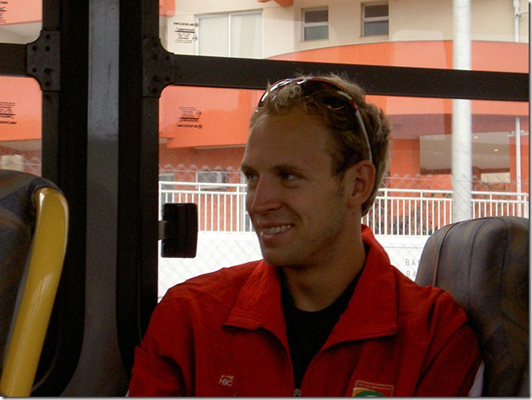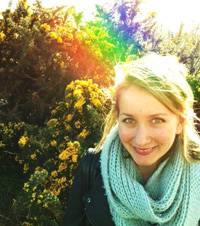We All Need A Little Encouragement :
Julia Kochuk in Conversation with Tik Maynard
 Malahat volunteer Julia Kochuk catches up with the winner of our 2012 Open Season Award for creative nonfiction, Tik Maynard.
Malahat volunteer Julia Kochuk catches up with the winner of our 2012 Open Season Award for creative nonfiction, Tik Maynard.What have you been up to since you won the 2012 Open Season Award in creative nonfiction? Have you been writing a lot?
I haven’t really been writing much at all. I’ve been riding horses a lot and competing. My girlfriend and I became engaged. She’s in England right now; she’s an alternate for the U. S. Olympics team, and she’s trying to get on the team right now. It’s a big deal to move a horse around the world. A flight for a person costs $1,000, but a flight for a horse costs, like, $5,000 to $10,000. Other than that, really not much. I’m reading a lot.
What are you reading?
One of the other 2012 Malahat contest winners recommended a book that takes place in the same area of the world [as “Buy BENSTON”]. It’s called The Bridge on the Drina by Ivo Andric. It was written in the 1940s. I’m just halfway through right now, but it’s amazing. It’s sort of like a history of Bosnia in a creative nonfiction kind of way.
You’ve really taken to writing about Mirza and Bosnia –two of your stories about the experiences of the Bosnian refugee have been short-listed for the CBC Literary Awards. You said in a previous interview that Mirza gave you enough material to write a whole book. Would you ever consider turning “Buy BENSTON”into something longer in the future?
First, Mirza’s not his real name, just the name I used. And I’ve got these two pieces and a lot of ideas for more. What I’d love to do is interview [Mirza’s] family, anyone I can find, and then write little pieces like [“Buy BENSTON”], maybe a bit longer, from the point of view of different people in his family. You could have a book with 12 or 15 stories with similar characters appearing in each one that’s all in creative nonfiction style.
All interconnecting?
Yeah. And the other thing―Mirza’s never been back to Bosnia since he left. I would love to go with him if he ever went back and experience that. What it would be like for him to go home. I could write a few stories from that.
What was Mirza’s reaction to you winning the Open Season Award with his story?
I think he was really excited. He knew me when I was in high school and he was in university. When I came up to him years later to see if he’d let me interview him for this story, he agreed to do it. Then when he read it after, it was emotional for him to see it all written down. He said it was pretty true to how it happened. And when I won, I think he was even happier. He told me he thought I’d grown up a lot since high school.
Have you grown even more as a writer since winning? Did winning the prize change your outlook on own writing style?
I think the first time that I was shortlisted for the [CBC Literary Awards], that totally changed my outlook: maybe I was capable of writing. Then winning this prize was awesome. I had the confidence that I could fail at stuff and keep going, keep writing. I didn’t need that confidence this time around to keep going. But it was just awesome to win.
So, winning was encouragement to keep writing?
As a writer, you always need some encouragement, whether it’s from your mom or from The Malahat Review.
How do you fit writing into your schedule when you have another demanding, full-time job?
It’s tough. There are good points and bad. The good points are, since I don’t get to write all the time, every time I do get to write I’m excited about it. I think if I wrote full-time I wouldn’t have the same enthusiasm to enjoy writing. I never get tired of it. The bad thing is, I do wish I had more time. It’s hard to find the time. Maybe as my career builds up with the horses, I’ll be able to take more time to write.
I could really read your excitement in “Buy BENSTON.” You had so many details and really brought the character to life. I felt as though Mirza must have been the author because the story was so real and well-researched.
You’re right; I was totally excited to write the piece. Not only because I knew the guy, but because it was one of the first things I wrote. And, when I was at UBC, I majored in history so that was exciting for me, and it also had a sports theme and I’ve participated in a lot of sports in my life. One of my favourite books from growing up is Jonathon Livingston Seagull [by Richard Bach]. He didn’t write that much, not for a living, but he wrote that one best-seller. Every time he wrote, he was really excited to write. I’d rather be that way than have fifty OK books. I’d rather write one.
What could you tell all those people out there who are like you? Those who aren’t full-time writers? Those who want to be excited about writing?
There’s no right way or wrong way to start writing. Just do it. If you can get excited about doing it, that’s all the better. It doesn’t matter if you’re going to write for magazines, for yourself, for contests―just write. And there’s that saying I’ve read somewhere, “fake it ‘til you make it.” Read writers you admire and imitate their style until you get your own.
Who did you “fake it” after before you developed a style of your own?
One of my favourite books is [Rohinton Mistry’s] A Fine Balance. I also really like the style of Barbara Kingsolver’s essays. Also, I really like John Steinbeck as a writer. He’s influenced my style.

Julia Kochuk
* * * * * * * *
Check out the guidelines for our 2013 Open Season Awards.









